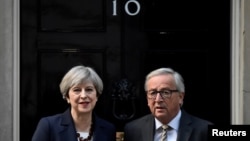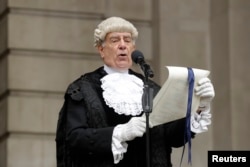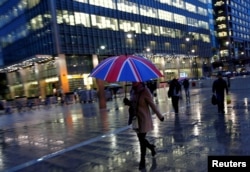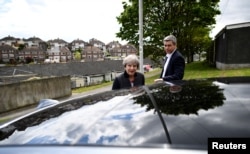Family lawyers often advise clients in an acrimonious divorce to keep face-to-face contact with estranged spouses to a minimum — best to leave the lawyers to handle the ugly financial details. Alas, last week a squabbling pair failed to heed the sage advice.
Britain’s Prime Minister Theresa May and the European Union’s Jean-Claude Juncker, president of the European Commission, had a dinner to discuss the terms of Britain’s exit from the EU. It wasn’t a success.
According to media accounts, Juncker told May on his departure, “I'm leaving Downing Street 10 times more skeptical than I was before.” And the morning after the dinner, he informed German Chancellor Angela Merkel that May was living in “another galaxy” and a “parallel reality.” Since then both sides have been busy briefing the media with their version of what was said at the dinner and who is at fault for mounting tensions between London and Brussels.
Upcoming election
On Wednesday, May, who had avoided commenting directly herself on the dinner, leaving it to aides to do so, kicked off her party’s election campaign with a full-blown and unusually strong attack on EU officials, accusing them of seeking to meddle in the British elections, wreck Brexit talks and damage Britain's economy.
No one believed Britain’s Brexit negotiations, slated to last two years, would be painless. But the sharp rhetoric in recent days, even before formal talks are entered, and the rising acrimony between London and Brussels, is beginning to persuade some that the chances of Britain crashing out of the EU without an exit agreement, and without a crucial trade deal, are mounting by the day.
Financial risks
International bankers think the risks are high. They are factoring in the strong possibility that Britain won't secure so-called passporting rights allowing financial institutions headquartered in London to trade in the EU as though Britain were still a member.
On Wednesday, the U.S. banking giant JP Morgan became the latest international financial company to say it would be moving some staff ahead of Britain’s formal exit from the EU.
Some of the insults being traded between Brussels and London should be seen as maneuvering ahead of serious negotiations.
The EU has hardened its stance noticeably. Brussels officials have increased in just a week the exit bill alone for Britain from $78 billion to $130 billion to cover liabilities and money London already committed for various EU projects and loans. They have also announced Britain will have no share in any EU assets after Brexit.
And its chief negotiator Michel Barnier has warned the exit bill is, in fact, non-negotiable and the consequences for Britain would be “explosive”, if it leaves the EU without paying it.
A new Thatcher?
Likewise, May is in a threatening pre-talks mood, presenting herself as the incarnation of the tough-minded Margaret Thatcher in a British election campaign that started formally on Wednesday, says Guardian newspaper columnist Jonathan Freedland.
“What could be more exquisitely Thatcheresque than Theresa May’s promise to be ‘a bloody difficult woman’ during upcoming Brexit negotiations? The phrase is a downmarket version of the Iron Lady sobriquet so gleefully embraced by Britain’s first female prime minister. They both tap into an archetype with deep roots in the national mythology: the warrior queen who defiantly defends these islands from hostile foreigners — Boudicca, Elizabeth I, Victoria, Britannia herself,” he argues.
Launching her election campaign, May played to the idea that she’s the only one able to defend Britain from Brussels. “The choice the country faces now is very simple because there are only two people who can be prime minister after June 8 to negotiate Brexit. It is a choice between me and [Labour leader] Jeremy Corbyn,” she said.
Maneuvering or not, acrimony can get out of control, sending squabbling, divorcing couples down trajectories they never planned on taking. And personal animus appears to be creeping in. Juncker on Wednesday tried to strike a more conciliatory tone, praising the “tough” British leader and saying he has “deep respect” for May. But there’s deep anger on both sides — British officials were furious with leaks about last week’s dinner and accuse Juncker and his aides of being behind them.
Dan Mulhall, Ireland’s ambassador to Britain, called on leaders on both sides to “take a deep breath and calm down.” But it isn't clear the main players are ready to listen.







